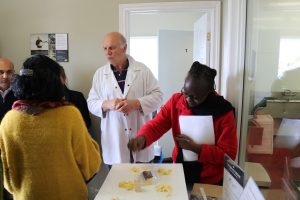By Yogesh Ghore and Farouk Jiwa
The current pandemic has caused significant disruptions in the supply chain of food across the world. The situation is affecting countries to varying degrees depending on the level of outbreak and the conditions of the restrictions. Nevertheless, both producers and consumers are affected. For instance, milk producers in Canada have had to dump milk down the drain.
According to a trade report referenced in a BBC article, some 500 dairy farms have been forced to dump five million liters of milk per week due to a lack in the demand from the restaurants and hospitality industries. The story of milk waste is same in the US and UK, and it is not just milk that is being wasted due to the pandemic: millions of pounds of eggs, onions, beans, cabbage, and fresh vegetables are going to waste as countries close down schools, restaurants, and hotels.
Another way in which the pandemic is affecting the global supply chain of food is the availability of labor. From production to retailing, the industry in North American and Western European countries relies heavily on overseas migrant workers. Due the travel restrictions, lock downs, self-isolations, and social distancing measures, there is short supply of labour.
Emerging economies are equally affected by the disruptions in the global food system, coupled with the Covid-19 partial or complete lockdowns. The supply of essential goods and services has been severely impacted in the developing world as well. While these lockdowns are a huge problem for the traditional ways in which supply chains used to function in these economies, it is opening up new opportunities for local businesses and community institutions.
Coady Institute at St. Francis Xavier University has a global network of partners and more than 9,000 graduates from 133 countries many who are working at the frontlines during this global pandemic. These partners and graduates are sharing how they are coping and responding to the crisis. While we have much in common, there are some interesting – and inspiring – differences.

Fraser Hunter of Knoydart Farms, Nova Scotia regularly welcomes Coady Institute participants to discuss how his organic dairy farm produces and distributes cheeses. Like many entrepreneurs across the globe, Hunter is adjusting his business model during the Covid-19 pandemic.
Farmer Producer Companies in India for example are buying produce from local farmers and are retailing locally given the centralised wholesale markets are closed. A long-time partner with Coady Institute, Rural Distribution (RUDI) uses an innovative grassroots business model. Owned and managed by rural women, RUDI is a rural distribution multi-trading company that procures grains and spices from more than 45,000 farmers through its local centers. Local women are employed to process and package the products. These products are then delivered within the local and neighbouring communities through RUDI Bens, a network of door-to-door sales women who make home deliveries. They can do all this while observing the social distancing norms and using mobile-based apps for accepting orders and inventory management.
Meanwhile, other Coady graduates are working with local women groups in the Indian states of Jharkhand, Madhya Pradesh, and Rajasthan by running community kitchens and supplying ration kits for the migrant workers who are returning home due to lockdowns in the big cities. Similar examples of community innovation and entrepreneurship are emerging elsewhere; one Coady graduate is leading the revival of community grocery stores on the island of St. Lucia in the Caribbean. These community stores, which had almost been abandoned due to competition from big chain stores, have now found a new lease on life.
Here in Nova Scotia, we have seen many local businesses switch to online ordering and home delivery including microbreweries and small producing farms. Coady participants are familiar with Knoydart Farm that produces organic cheese and is innovating by switching to online ordering and home delivery, ensuring the supply of their local healthy products in a time of crisis.
The key takeaways from these stories include the agility and flexibility of these micro and small enterprises in terms of adopting new technologies, changing delivery mechanisms, and adopting to new products and roles. Local leadership poised with compassion and ingenuity obviously drove this.
There is no either-or solution in the fight against the coronavirus. The efforts of the governments will have to be supported by others as “we are all in this together”. The stories of community innovation in times of crisis, as highlighted here present an opportunity to look at the role of citizens in shaping their own development beyond the current crisis. In other words, how can we use the current opportunity to create a new ‘normal’ where the communities and workers are at the center of the new economy? Or is this going to be a blip instead of a transformative moment for new ways of working?
Ghore is a senior program staff member and Jiwa is a program associate at Coady Institute. They co-facilitate Coady’s programs in the Inclusive Economies thematic area including the Livelihoods and Markets, Social Enterprise, and Future of Work programs. Coady Institute located at St. Francis Xavier University has been working with community-based organisations like RUDI for the last 60 years supporting leadership and knowledge building that fosters innovation and entrepreneurship at the community level. With new partnerships, including that with the StFX’s Centre for Employment Innovation, Coady is connecting global and local by providing opportunities to strengthen learning and innovation internationally and here in Nova Scotia. With new partnerships, including that with the StFX’s Centre for Employment Innovation, Coady is connecting global and local by providing opportunities to strengthen learning and innovation in Nova Scotia.
